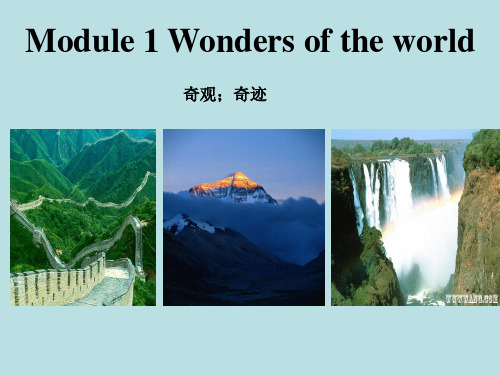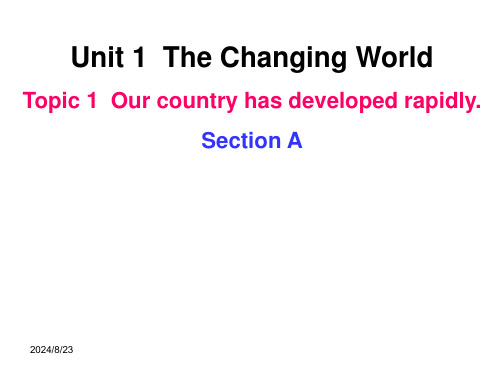九年级英语第一单元PPT课件
合集下载
外研版九年级英语上册:Module1Unit1课件(共49张PPT)

Words and expressions
• • • • • • • • • • in five minutes 5分钟后(常用于一般将来时) look down to 向下看,俯视 get out of (从……内) 出来 walk along 沿着…… 走 = go along one of … · · · · · ·之一 at the bottom of 在· · · · · ·底部 look over 查看;检查;调查 have gone to 到某地去了 because of 因为 faster and faster 越来越快
fall away and down to …降到……/ 落到 …... 山那边地势向河边陡然倾斜。 falls away Beyond the hill, theto land __________ down sharply and ________the river.
9. I looked down to the Colorado River, a silver stream nearly one mile below me. a) look down 俯视 look up and down 上下打量 look down on / upon sb. / sth. 鄙视或瞧不起 某人/某物 当我在街上遇见我的朋友时,他上下打量我。 looked me and up and down My friend _________________________ when he met me in the street. 我看不起那些只爱钱的人。 look down / upon people who only I ________________ love money.
Words and expressions
九年级英语上册第一单元ppt课件

ad 入 学 习 习近平 新时代 中国特 色社会 主义思 想和党 的十九 大精神 ,贯彻全 国教育 大会精 神,充分 发挥中 小学图 书室育 人功能
There is more than one pronunciation of
“dessert”.
n. 发音;读音
A
B
为 深 入 学 习 习近平 新时代 中国特 色社会 主义思 想和党 的十九 大精神 ,贯彻全 国教育 大会精 神,充分 发挥中 小学图 书室育 人功能
I had a long conversation with her the
other day.
n. 交谈;谈话
A
B
为 深 入 学 习 习近平 新时代 中国特 色社会 主义思 想和党 的十九 大精神 ,贯彻全 国教育 大会精 神,充分 发挥中 小学图 书室育 人功能
He read the letter aloud to us.
为 深 入 学 习 习近平 新时代 中国特 色社会 主义思 想和党 的十九 大精神 ,贯彻全 国教育 大会精 神,充分 发挥中 小学图 书室育 人功能
为 深 入 学 习 习近平 新时代 中国特 色社会 主义思 想和党 的十九 大精神 ,贯彻全 国教育 大会精 神,充分 发挥中 小学图 书室育 人功能
by working with by reading the
friends
textbook
为 深 入 学 习 习近平 新时代 中国特 色社会 主义思 想和党 的十九 大精神 ,贯彻全 国教育 大会精 神,充分 发挥中 小学图 书室育 人功能
What does this sentence mean? n. 句子
A
B
为 深 入 学 习 习近平 新时代 中国特 色社会 主义思 想和党 的十九 大精神 ,贯彻全 国教育 大会精 神,充分 发挥中 小学图 书室育 人功能
外研版九年级英语上册课件:Module 1 Unit 1 (共26张PPT)

1.1_0_0______ 2._1_,_7_0_0_ __m_e_t_r_e_s___ ___m_e_t_r_e_s
3.2_,_3_0_0____ 4.1_8_5______ 5._1_5____ __m_e_t_r_e_s___ __m_e_t_r_e_s___ ___m_e_t_r_e_s
三、根据(课本)P2 Activity 3的对话内容,完成短文 填空
3. ones,they/them与those的区别
These shoes are too small. Please get me some larger ones.这些鞋子太小了。请给 我一些大点的。(ones=some shoes)
Kevin is looking for his glasses, have you seen them? 凯文正在找他的眼镜,你看 到它们了吗? (them=his glasses)
(A)2. —When were you born, Michael?
—I was born in a small village
with only three _____ people.
A. hundred
B. thousands
C. hundreds of D. million of
语篇理解
一、听对话
Her interests are different from those of her childhood.她的兴趣爱好跟孩提时的 不一样了。(those=interests)
专练
(C)1. The population of China is larger
than _____ of Japan.
It was hard work, I enjoyed it, though.这是个 艰苦的工作,不过我喜欢。
人教版九年级unit1全单元课件(94张PPT)

现在完成时强调这一动作与现
在的关系,如对现在产生的结
果、影响等,而一般过去时只
表示过去的事实,不表示和现
在的关系。如:
I have just been to London. I went there last month. 我刚去过伦敦,是上个月去的。 I have been to the science museum many times. I went there on our last summer vocation. 我已经去了科学博物馆很多次。 上个暑假我还去了呢。
How do you study English?
I study English by taking part in English Contest
How do you study English?
I study English by watching English movies
“by + 动名词”常常表示手段、 方式或方法,可以用来回答how引 导的特殊疑问句。
have (has) been to 后面可接次数, 表示去过某地几次。 I’ve been to Beijing three times. 我去过北京三次。 They have been to that village several times. 他们去过那个村庄好几次了。
2. have (has) gone to 意为“到某 地去了”,表示到了某地或正在 去某地的途中。总之,说话时该 人不在现场,一般不用第一、第 二人称代词作句子的主语。如: - Where is Tom? 汤姆在哪里? - He has gone to the bookshop.
2. But I was afraid to ask questions because my pronunciation was very bad.
人教版九年级全册Unit1课件 (共25张PPT)

Are these habits good or bad? Why?
listening to music when learning
sleeping in class
talking with other students in class
They are not good habits for learning English.
1. What does “Practice makes perfect.” mean? Keep practicing. 2. If successful learners make mistakes, what do they often do? They learn from mistakes.
Read, study and learn about everything imporant in your life
Read Paragraph 3 and answer the questions.
Practicing and learning from mistakes Good learners think about what they are good at and what they need to practice more. Remember, “Use it or lose it.” Even if you learn something well, you will forget it unless you use it. “Practice makes perfect.” Good learners will keep practicing what they have learned, and they are not afraid of making mistakes. Alexander Graham Bell did not invent the telephone overnight. He succeeded by trying many times and learning from his mistakes.
listening to music when learning
sleeping in class
talking with other students in class
They are not good habits for learning English.
1. What does “Practice makes perfect.” mean? Keep practicing. 2. If successful learners make mistakes, what do they often do? They learn from mistakes.
Read, study and learn about everything imporant in your life
Read Paragraph 3 and answer the questions.
Practicing and learning from mistakes Good learners think about what they are good at and what they need to practice more. Remember, “Use it or lose it.” Even if you learn something well, you will forget it unless you use it. “Practice makes perfect.” Good learners will keep practicing what they have learned, and they are not afraid of making mistakes. Alexander Graham Bell did not invent the telephone overnight. He succeeded by trying many times and learning from his mistakes.
仁爱版 初三英语九年级上册Unit1 Topic1PPT课件

Unit 1 The Changing World
Topic 1 Our country has developed rapidly. Section A
2024/8/23
2024/8/23
2024/8/23
• have/has been to…去过。。。 • He has been to Hubei. • 他去过了湖北 (人已经不在湖北) • I have been to Beijing. • 我去过了北京。(人已经不在北京) • have/has gone to... • 已经去了,它强调主语此时不在说话地点。 • e.g. She has gone to Hubei. • 她已经去了湖北。(人已经不在说话地点) • She has gone to Beijing. • 他已经去了北京。 (人已经不在说话地点)
2024/8/23
p124
2024/8/23
Find the sentences with Present Perfect Tense in Section A. Read them aloud.
You have just come back from your hometown.
Great changes have taken place there and my hometown has become more and more beautiful.
2024/8/23
2a TLhisetennetoxtthedcaoyn,vMerasartiiaoncaanmd feillbinatchke .blSanhkes.mTheetn practice it withMyoicurhpaaertlneirn. the school.
Topic 1 Our country has developed rapidly. Section A
2024/8/23
2024/8/23
2024/8/23
• have/has been to…去过。。。 • He has been to Hubei. • 他去过了湖北 (人已经不在湖北) • I have been to Beijing. • 我去过了北京。(人已经不在北京) • have/has gone to... • 已经去了,它强调主语此时不在说话地点。 • e.g. She has gone to Hubei. • 她已经去了湖北。(人已经不在说话地点) • She has gone to Beijing. • 他已经去了北京。 (人已经不在说话地点)
2024/8/23
p124
2024/8/23
Find the sentences with Present Perfect Tense in Section A. Read them aloud.
You have just come back from your hometown.
Great changes have taken place there and my hometown has become more and more beautiful.
2024/8/23
2a TLhisetennetoxtthedcaoyn,vMerasartiiaoncaanmd feillbinatchke .blSanhkes.mTheetn practice it withMyoicurhpaaertlneirn. the school.
人教版九年级上册英语课件:Unit 1 Section A(3a-4c) (共22张PPT)
• 5.【辨析】as well、also、too与either。四者都可意为“也,还”, 但用法有区别。(1)as well是副词短语,常用于口语中。它相当于too, 通常位于肯定句句末,多与and和but搭配使用。(2)also通常位于be 动词、助动词和情态动词之后,实义动词之前。(3)too比also更口语 化,常用于肯定句中,既可放在句中,也可放在句末。常用逗号与句 子其他成分隔开。(4)either用于否定句句末。
• _____W__h_a_t/_H_o_w__ ______a_b_o_ut__going fishing this weekend?
• 5.My brother is only five years old,but he can play the piano very Awlethlol.ugh/Though
• 4.Taking no_t_e_s_____ is a good way to learn English.
• 5.His favourite subject isph_y_s_i_cs_________(物理) and he is very
good at it.
grammar
• 6.I find it hard to learn English _____________(语法).
• ③use是动词,意为“使用”,在句中作谓语。
基础训练
• 一、根据句意及首字母或中文提示写出单词。
• 1.He revealed (泄露) thes_ec_r_e_t________ (秘密) by accident.
• 2.He _____d_is_c_o_v_e_re_d____ (发现) a beautiful island. • 3.【山东烟台中考】John is interested cihnem__is_tr_y___________(化学).
Unit 1 课件(共35张PPT) 人教版九年级全册
1) It is no use/ good / useless + doing... 2) It is a waste of time + doing ... 3) It is fun + doing ... 在以上结构中常用动名词作主语。 It’s no use crying over spilt milk. 覆水难收。 It is fun playing with children. 和孩子们一起玩真好。
New words
Unit 1 Section A (Grammar Focus-4c)
repeat /rɪˈpiːt/
v.重复;重做
note /nəʊt/
n. 笔记;记录 v.注意;指出
pal /pæl/ n.朋友;伙伴 physics /ˈfɪzɪks/ n. 物理;物理学
chemistry /ˈkemɪstri/
A. playing B. to play C. play
Textbook
Unit 1 Section A (Grammar Focus-4c)
4a Match the questions and answers.
1. How do you practice speaking?
a. By watching English programs.
A. tell B. to tell C. telling
Grammar Focus
Unit 1 Section A (Grammar Focus-4c)
2. 用作宾语 1)作动词的宾语 常见的此类动词有:practise, understand, worry about, finish, give up, keep, keep on, look forward to, mind, miss, enjoy, depend on, cannot help, suggest, pay attention to, think about, succeed in, be used to, get used to, put off,等。
人教版九年级英语上册教学课件:Unit 1 Section B (1a-2e) (共24张PPT)
Paul finds it difficult to learn English. Listen and complete the learning challenges he talks about.
Challenges 1. He can’t get the _p__ro_n__u_n_c_ia_t_io_n_______ right.
attention to it for a long time.
Choose the key words to help you understand each
Practicing and learning from Use it or lose it.tice makes perfect.Learn from mistakes
5. What study skills does the writer talk about? Do you have those study skills? Creating an interest in what they learn; Practicing and learning from mistakes; Developing their study skills; Asking questions
Examples If they need to learn English and they like music or sports, they can listen to English songs or watch sports programs in English.
Practicing and learning from mistakes
Language points
pronounce v. 发音 pronunciation n. 发音 I can’t pronounce the word correctly. ≈ I can’t_g_e_t _th_e__p_r_o_n_u_n_c_i_a_ti_o_n_r_i_g_h_t_.
Unit 1 课件(共58张PPT) 人教版九年级全册
Language points
1 born be born in + 地点或非具体日期 be born on + 具体日期 He was born in Beijing in 2001. 2001年他出生在北京。
She was born on October 1st. 她出生于十月一号。
Unit 1 Section B (2a-Self Check)
writing down key words or drawing mind maps. They also
look for ways to review what they have learned. They may do
this by reading their notes every day or by explaining the
Language points
Unit 1 Section B (2a-Self Check)
3 whether
whether 与 if 都有“是否”的意思,后都接宾语从句。 区别:
whether能够与直接or not连用,而if不可以; whether 可以跟 to do ,而if不可以; 介词+whether+ 宾从,而if从句不作介词宾语。
time. Good learners often connect what they need to learn with
something interesting. For example, if they need to learn English
and they like music or sports, they can listen to English songs or
